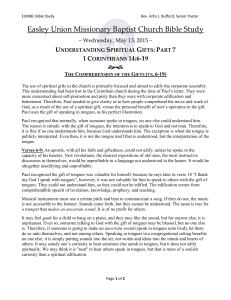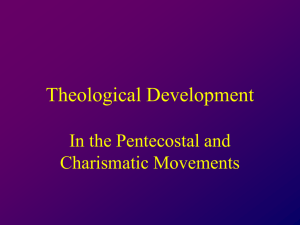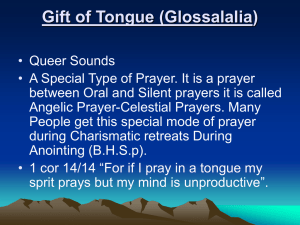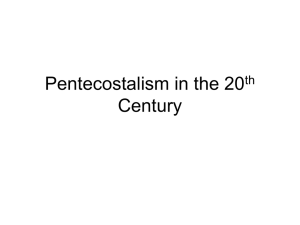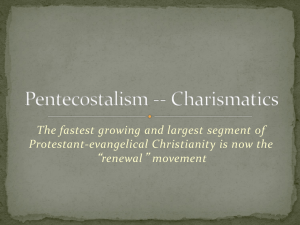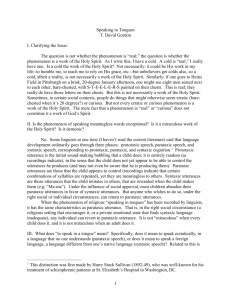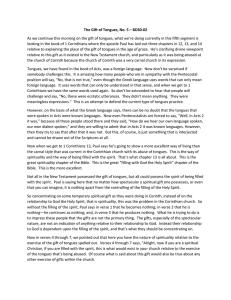Misunderstanding Spiritual Gifts
advertisement
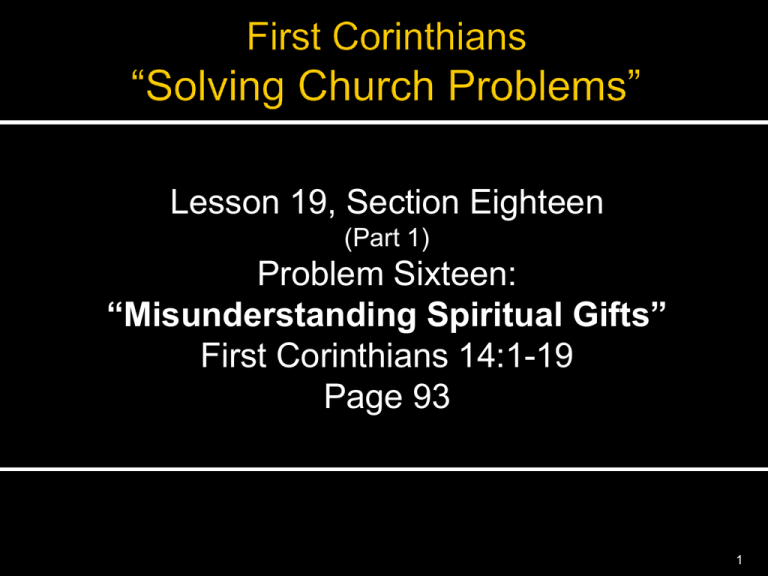
Lesson 19, Section Eighteen (Part 1) Problem Sixteen: “Misunderstanding Spiritual Gifts” First Corinthians 14:1-19 Page 93 1 Gifts were given for the purpose of revealing the truth of God’s plan for man and to confirm it They were temporary and passed away The complete word of God is available today The apostles and the household of Cornelius were baptized with the Holy Spirit Others were given the gifts by the apostles Without love, they were not effective and caused church problems The gift of prophesy was the greater gift 2 Paul told the Corinthians that love was the most important aspect of spiritual gifts Without love, they were not effective He pointed out the value of love and the characteristics of love But, love never fails Spiritual gifts were “in part” until that which was “perfect” came [God’s complete revelation] He ended his discussion on love by saying: “And now abide faith, hope, love, these three; but the greatest of these is love.” 3 Pursue love, and desire spiritual gifts, but especially that you may prophesy. 2. For he who speaks in a tongue does not speak to men but to God, for no one understands him; however, in the spirit he speaks mysteries. 3. But he who prophesies speaks edification and exhortation and comfort to men. 4. He who speaks in a tongue edifies himself, but he who prophesies edifies the church. 5. I wish you all spoke with tongues, but even more that you prophesied; for he who prophesies is greater than he who speaks with tongues, unless indeed he interprets, that the church may receive edification. 1. 4 Spiritual gifts were given to benefit others (12:7) “But the manifestation of the Spirit is given to each one for the profit of all” So, follow after love and desire spiritual gifts (1) Many of the Corinthians had: (1) neglected to “pursue” real brotherly love; (2) chosen instead to pursue spiritual gifts; (3) mistaken the relative values to the church of prophesying and tongue-speaking, opting for tongues; (4) abused the use of their gifts of tongues in the church assemblies. 5 The gift of prophesy is greater than the gift of tongues The gift of tongues was “the God-given ability to speak in a language that was unknown to the speaker – a supernatural ability” (See Acts 2:4-11) Tongues were to be a sign to unbelievers (14:22) The gift of prophesy was the more useful gift The gift of prophesy was “the God-given ability to speak God’s word in one’s own language” It was direct communications from heaven [Holy Spirit] Prophesies were to be a sign for believers (14:22) 6 Speaking in tongues had no benefit to the church unless there was someone who could interpret (2) Either silently or in private, he could speak in the spirit his “mysteries” to God The gift of interpretation (12:30) was “a God-given ability to understand one speaking in a language which was not his native tongue - foreign to that individual” The gift of prophesy was used to provide instantaneous edification, exhortation, and comfort to the church (v3) 7 Prophesy [inspired teaching] had the greatest value (4) This is how men learned God’s will The one speaking in tongues [unknown language] edifies himself (4) It is of no value to the church if no one can understand what he is saying The Corinthians should have desired the greater gift (5) The most important element is – that the church may receive edification 8 6. 7. 8. 9. 10. But now, brethren, if I come to you speaking with tongues, what shall I profit you unless I speak to you either by revelation, by knowledge, by prophesying, or by teaching? Even things without life, whether flute or harp, when they make a sound, unless they make a distinction in the sounds, how will it be known what is piped or played? For if the trumpet makes an uncertain sound, who will prepare for battle? So likewise you, unless you utter by the tongue words easy to understand, how will it be known what is spoken? For you will be speaking into the air. (continued on next page) 9 10. 11. There are, it may be, so many kinds of languages in the world, and none of them is without significance. Therefore, if I do not know the meaning of the language, I shall be a foreigner to him who speaks, and he who speaks will be a foreigner to me. 10 If Paul came to them speaking in tongues, what good would it do unless he spoke by revelation, knowledge, or by prophesying, or by doctrine (6) The foolishness of tongues-for-tongues-sake is illustrated by: A flute or a harp – (7) A trumpet signal – (8) Without words that are “easy to understand,” you are speaking into the air (9) This has application to preachers and teachers today! 11 There are so many different languages in the world and they are all important (10) A language has but one purpose: to allow sensible communication from one person to another Communication cannot take place unless the speaker and hearer understands the meaning of words (11) God’s purpose in giving some the ability to speak in different languages was to communicate the Word so others could receive it in their own language This operation occurred on the day of Pentecost with great effectiveness (See Acts 2) 12 Even so you, since you are zealous for spiritual gifts, let it be for the edification of the church that you seek to excel. 13. Therefore let him who speaks in a tongue pray that he may interpret. 14. For if I pray in a tongue, my spirit prays, but my understanding is unfruitful. 15. What is the conclusion then? I will pray with the spirit, and I will also pray with the understanding. I will sing with the spirit, and I will also sing with the understanding. 16. (continued on next page) 12. 13 16. 17. 18. 19. Otherwise, if you bless with the spirit, how will he who occupies the place of the uninformed say “Amen” at your giving of thanks, since he does not understand what you say? For you indeed give thanks well, but the other is not edified. I thank my God I speak with tongues more than you all; yet in the church I would rather speak five words with my understanding, that I may teach others also, than ten thousand words in a tongue. 14 The Corinthians were zealous for spiritual gifts (12) Paul’s advice was to desire those gifts that would edify the church One that had the gift of tongues should pray for the additional gift to interpret (13) If one prays in a tongue, his spirit prays but his understanding was lacking (14) 15 “I will pray with the spirit and I will pray with the understanding” (15) “I will sing with the spirit and I will sing with the understanding” (15) Two elements were necessary for these communications: The “spirit” – the message from the Holy Spirit to the speakers spirit The “understanding” – what the message meant Without these, how can one say “amen” at the giving of thanks? (16,17) 16 Paul was not limited in his ability to speak in tongues But, in the church, he would rather speak five words that could be understood than ten thousand words in an unknown tongue 17

